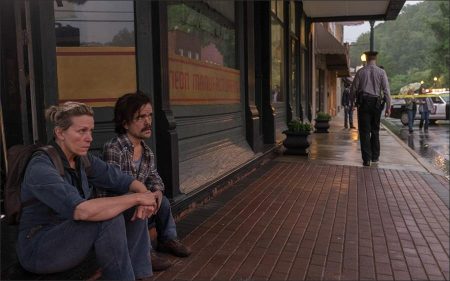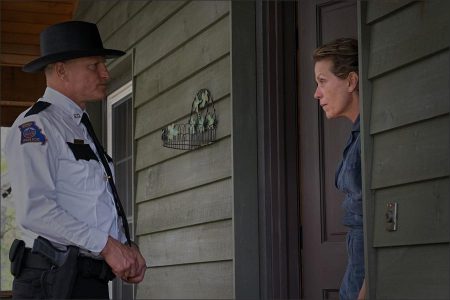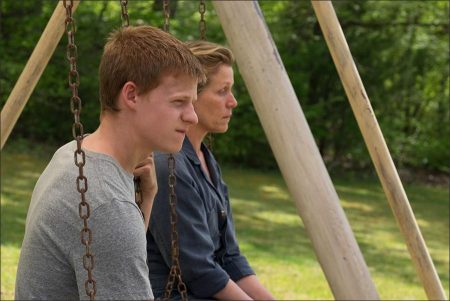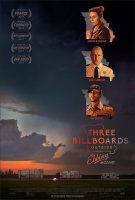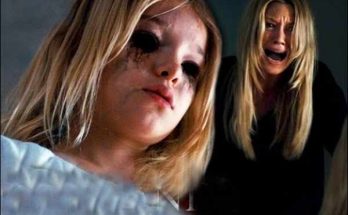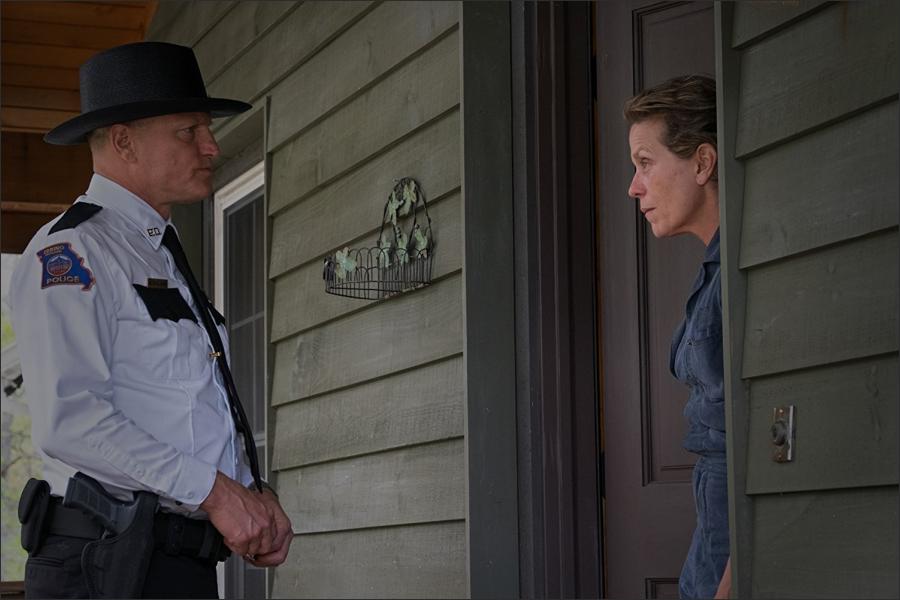Film Review for Three Billboards Outside Ebbing, Missouri
Three Billboards Outside Ebbing, Missouri Movie Trailer. Life and death, heaven and hell, damnation and redemption collide in this blisteringly foul-mouthed, yet surprisingly tender, tragicomedy from British-Irish writer-director Martin McDonagh. Lacing a western-tinged tale of outlaw justice with Jacobean themes of rape, murder and revenge, McDonagh’s second American-set feature finds a grieving mother naming and shaming the lawmen who have failed to catch her daughter’s killer.
The subject is no laughing matter, but as with his 2008 debut feature, In Bruges, McDonagh’s Chaucerian ear for obscenity provokes giggles, guffaws and gasps in the most inappropriate circumstances. More importantly, he underpins the anarchic nihilism of his narrative with a heartbreaking meditation upon the toxic power of rage. When characters, struggling to make sense of all this chaos, utter platitudes such as “anger just begets greater anger” and “through love comes calm”, it seems less like a killing joke than a weirdly sincere mission statement.
Seven months after her daughter, Angela, was abducted and killed, Mildred Hayes (Frances McDormand) emblazons the roadside billboards of the title with signs taunting police chief Willoughby (Woody Harrelson) about the lack of arrests. For Mildred, the Ebbing police force is “too busy going round torturing black folks” to solve crime. “I got issues with white folks too,” declares bozo cop Jason Dixon (Sam Rockwell) after throwing someone out of a window – a bravura one-shot sequence pointedly orchestrated to the lilting strains of His Master’s Voice by Monsters of Folk.
Beneath the cracker caricatures, however, even Ebbing’s most apparently unsympathetic residents have complex lives. While ad man Red Welby (Caleb Landry Jones) pointedly reads Flannery O’Connor’s A Good Man Is Hard to Find, family man Willoughby looks beyond his own mortality, attempting to find the best in everyone, including the aggressively infantile Dixon. And the righteously angry Mildred has her own demons, torturing her bullied son, Robbie (Lucas Hedges), with her guilt-driven vendetta, wrestling with the awful possibility that “there ain’t no God, and the whole world’s empty, and it doesn’t matter what we do to each other”.
With its tolling-bell nods to High Noon (amplified by composer Carter Burwell’s spaghetti-tinged guitar themes), and cheeky references to the American gothic of Psycho (Sandy Martin’s domineering Momma Dixon seems to have walked straight out of the Bates Motel), this magical-realist parable finds McDonagh far more in tune with the US landscape than in his disappointing Seven Psychopaths (2012). From the opening morning-mist shots of those lonely billboards to the flames that evoke the burning crosses of the KKK, cinematographer Ben Davis perfectly captures the film’s knife-edge balance between humour and horror, mayhem and melancholia.
While McDonagh’s script contains a familiar carnivalesque litany of “fuckheads”, “funny-eyed old ladies” and “fat dentists”, the excellent ensemble cast ensures that even peripheral characters have depth and heft. Amanda Warren and Darrell Britt-Gibson work wonders with small but significant roles as Mildred’s accidental support network, both experiencing the sharp end of Ebbing’s retrograde law enforcement, while Clarke Peters exudes understated gravitas as incoming police chief Abercrombie, viewing the unfolding idiocy with the same quiet astonishment that Cleavon Little brought to Blazing Saddles. Peter Dinklage wrings pathos from the role of love-struck car salesman James, while Abbie Cornish and John Hawkes are much more than mere foils for their respective screen partners.
As for McDormand, the stoically unsentimental Mildred, who sports a blue-collar jumpsuit and ready-for-action bandana, offers the best vehicle for her deadpan talents since Fargo’s Marge Gunderson. While McDonagh’s dialogue is ripe and chewy, McDormand has the power to speak volumes in silence. An early scene in which she gazes at the derelict billboards, fiercely chews a fingernail, then lets her hand gently graze her chin as her head falls back in thought tells us all we need to know about her dawning plan and her determination to follow it through.
Whether each of these characters is on a road to redemption or ruin is left open-ended. McDonagh’s rejection of clear-cut moral certainties has already provoked a backlash from some commentators; a recent Huffington Post article, for example, argued that Dixon is essentially “the racist uncle whom white liberals fear and love”. Awards attention (four Golden Globe wins, umpteen Bafta nominations) has turned up the heat on such highly charged debates. Yet I was not left contemplating the film’s thorny racial politics, but instead remembering the closing moments of Straw Dogs; of the chaos left in the wake of violence and the wistful possibility (however remote) of transcending its awful legacy.
Three Billboards Outside Ebbing, Missouri (2017)
Directed by: Martin McDonagh
Starring: Frances McDormand, Woody Harrelson, Sam Rockwell, Caleb Landry Jones, Kerry Condon, Alejandro Barrios, Abbie Cornish, Amanda Warren, Malaya Rivera Drew, Riya May Atwood, Selah Atwood
Screenplay by: Martin McDonagh
Production Design by: Inbal Weinberg
Cinematography by: Ben Davis
Film Editing by: Jon Gregory
Costume Design by: Melissa Toth
Set Decoration by: Merissa Lombardo
Art Direction by: Jesse Rosenthal
Music by: Carter Burwell
MPAA Rating: R for violence, language throughout, and some sexual references.
Distributed by: Fox Searchlight Pictures
Release Date: November 10, 2017 (United States), January 12, 2018 (United Kingdom)
Views: 157
